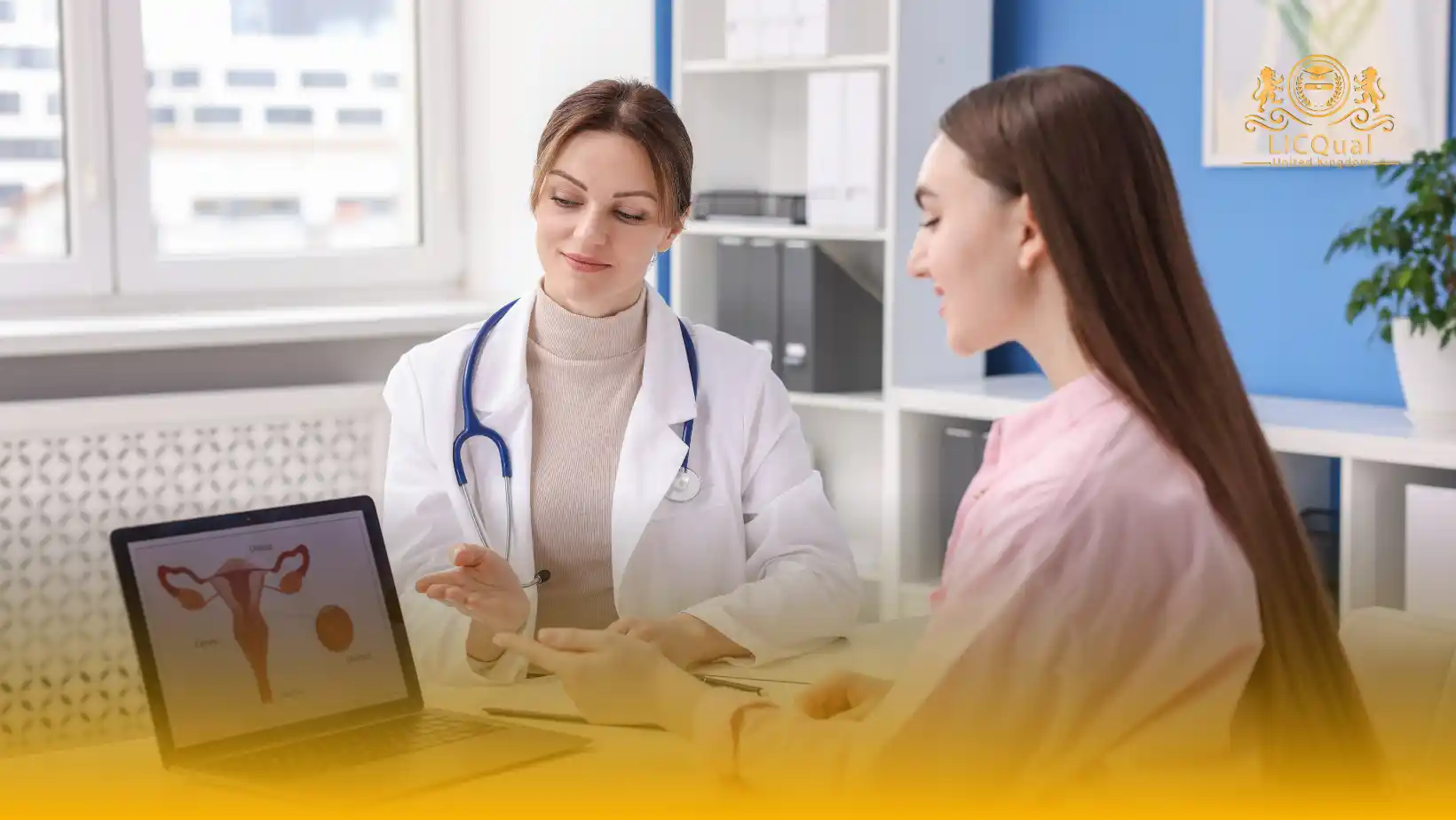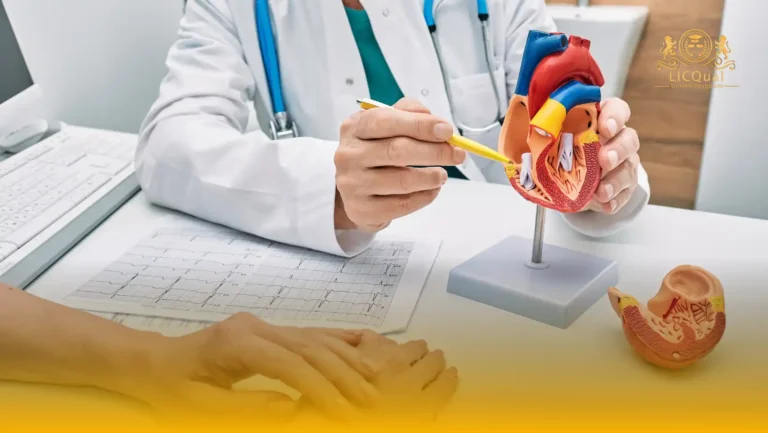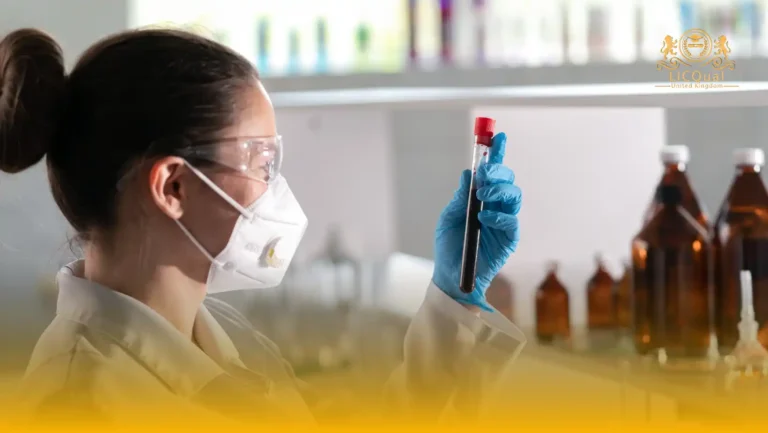The LICQual Level 3 Diploma in Reproductive Medicine (Dip RM) is a specialised qualification designed for healthcare professionals seeking to advance their expertise in reproductive health and fertility management. This programme is not intended for fresh candidates but is aimed at experienced learners who wish to expand their professional knowledge, enhance career prospects, and strengthen their Continuing Professional Development (CPD).
Reproductive medicine is a critical field that addresses the diagnosis, treatment, and management of fertility and reproductive health issues. Through this diploma, learners will gain advanced insight into reproductive physiology, infertility assessment, assisted reproductive technologies (ART), ethical considerations, and patient-centred care. The course equips learners with the knowledge and skills to support individuals and couples in achieving optimal reproductive outcomes, while adhering to professional and ethical standards.
The Dip RM programme is aligned with international standards, offering a balanced combination of theoretical knowledge and practical application. Learners will develop competencies in clinical assessment, laboratory procedures, fertility treatments, and evidence-based practice. By completing this qualification, professionals are well-prepared to contribute effectively to reproductive healthcare services and improve patient outcomes.
Centres delivering the LICQual Level 3 Diploma in Reproductive Medicine must have competent and qualified staff, supported by up-to-date learning resources, clinical facilities, and assessment tools to ensure high-quality training. This commitment guarantees that learners receive a comprehensive, engaging, and professionally rewarding educational experience.
The LICQual Level 3 Diploma in Reproductive Medicine is therefore an ideal pathway for healthcare professionals dedicated to advancing their knowledge, enhancing their skills, and making a meaningful impact in the field of reproductive health.
Course Overview
Qualification Title
LICQual Level 3 Diploma in Reproductive Medicine (Dip RM)
Total Units
6
Total Credits
60
GLH
240
Qualification #
LICQ2200891
Qualification Specification
To enroll in the LICQual Level 3 Diploma in Reproductive Medicine (Dip RM), applicants must meet the following criteria:
|
Qualification# |
Unit Title |
Credits |
GLH |
|---|---|---|---|
|
LICQ2200891-1 |
Principles of Reproductive Medicine and Fertility Care |
10 |
40 |
|
LICQ2200891-2 |
Anatomy, Physiology, and Endocrinology of Reproductive Systems |
10 |
40 |
|
LICQ2200891-3 |
Infertility Assessment and Diagnostic Techniques |
10 |
40 |
|
LICQ2200891-4 |
Assisted Reproductive Technologies (ART) and Treatment Methods |
10 |
40 |
|
LICQ2200891-5 |
Ethical, Legal, and Psychological Considerations in Reproductive Medicine |
10 |
40 |
|
LICQ2200891-6 |
Professional Practice, Clinical Governance, and CPD in Reproductive Medicine |
10 |
40 |
By the end of this course, learners will be able to:
Unit 1: Principles of Reproductive Medicine and Fertility Care
- Explain the scope and role of reproductive medicine within healthcare.
- Describe key principles of fertility care and patient-centred practice.
- Analyse the impact of reproductive health issues on individuals and couples.
- Apply foundational knowledge to support safe and effective reproductive care.
Unit 2: Anatomy, Physiology, and Endocrinology of Reproductive Systems
- Describe the structure and function of male and female reproductive systems.
- Explain hormonal and physiological processes involved in reproduction and fertility.
- Analyse how reproductive anatomy and endocrinology affect fertility and clinical outcomes.
- Evaluate age-related and pathological factors influencing reproductive health.
Unit 3: Infertility Assessment and Diagnostic Techniques
- Identify common causes of infertility in both males and females.
- Explain diagnostic procedures and assessment tools used in fertility evaluation.
- Analyse patient data to support evidence-based decision making.
- Apply clinical reasoning to develop appropriate care and management plans.
Unit 4: Assisted Reproductive Technologies (ART) and Treatment Methods
- Explain key ART procedures, including IVF, ICSI, and gamete donation.
- Assess the suitability of different treatment methods based on patient needs.
- Demonstrate understanding of laboratory techniques and clinical applications in ART.
- Evaluate the effectiveness, risks, and outcomes of reproductive treatments.
Unit 5: Ethical, Legal, and Psychological Considerations in Reproductive Medicine
- Demonstrate understanding of ethical principles in reproductive healthcare.
- Apply legal and regulatory frameworks to clinical practice.
- Analyse the psychological and emotional impact of infertility and treatment on patients.
- Develop strategies to provide empathetic, ethical, and professional care.
Unit 6: Professional Practice, Clinical Governance, and CPD in Reproductive Medicine
- Apply professional standards and clinical governance principles in reproductive medicine.
- Demonstrate accountability, safety, and best practices in patient care.
- Reflect on the importance of Continuing Professional Development (CPD) in maintaining competence.
- Develop strategies for lifelong learning and professional growth within reproductive healthcare.
The LICQual Level 3 Diploma in Reproductive Medicine (Dip RM) is designed for healthcare professionals, students, and practitioners who want to specialize in fertility, reproductive health, and assisted reproductive technologies (ART). This accredited reproductive medicine diploma is ideal for those seeking CPD accreditation, career advancement, and practical skills in infertility assessment, reproductive endocrinology, and ethical patient care. Whether you are already working in healthcare or planning to focus on reproductive medicine, this Level 3 qualification equips you with the expertise to deliver safe, evidence-based, and patient-centered care.
1. Doctors and Medical Practitioners
- Strengthen expertise in fertility and reproductive health management
- Gain advanced skills in infertility diagnosis and treatment planning
- Enhance qualifications with an accredited reproductive medicine diploma
- Apply evidence-based practices in hospitals and fertility clinics
- Earn CPD points to support ongoing professional development
2. Nurses and Allied Healthcare Professionals
- Build confidence in supporting patients undergoing fertility treatments
- Learn strategies for managing reproductive health and ART procedures
- Strengthen qualifications with a CPD accredited reproductive medicine course
- Improve ability to assist doctors in reproductive and gynecological care
- Gain practical skills for both hospital and community-based healthcare
3. Medical and Healthcare Students
- Develop a strong foundation in reproductive medicine and fertility care
- Gain a competitive edge for future healthcare and research careers
- Access flexible online learning while continuing academic studies
- Learn practical approaches to reproductive endocrinology and ART
- Earn a recognized Level 3 reproductive medicine qualification early in your career
4. Fertility and IVF Clinic Staff
- Strengthen expertise in assisted reproductive technologies (ART)
- Learn strategies for patient counseling and treatment support
- Build qualifications for roles in fertility and IVF centers
- Gain skills in reproductive endocrinology and lab-based procedures
- Improve patient-centered care in sensitive reproductive health cases
5. Public Health and Community Health Practitioners
- Understand the role of reproductive medicine in population health
- Learn strategies for integrating fertility care into public health programs
- Contribute to national and global reproductive health initiatives
- Build qualifications for roles in NGOs and government agencies
- Apply reproductive medicine principles to community-level health challenges
6. Researchers and Academic Scholars
- Enhance expertise in reproductive medicine and clinical research
- Learn advanced methods in fertility and reproductive endocrinology studies
- Strengthen qualifications for academic and research careers
- Gain skills to contribute to medical innovation and reproductive health solutions
- Build a pathway toward higher-level specialization in reproductive medicine
7. Career Changers and Lifelong Learners
- Explore opportunities in healthcare, reproductive medicine, and fertility care
- Gain an affordable and accessible qualification in reproductive medicine
- Build transferable skills for roles in education, research, or NGOs
- Learn at your own pace with flexible online study options
- Strengthen your CV with a recognized diploma in reproductive medicine
Centres delivering the LICQual Level 3 Diploma in Reproductive Medicine (Dip RM) must meet strict standards to ensure high-quality training, learner success, and alignment with international best practices. The key requirements include:
- Qualified and Competent Staff: Centres must employ experienced trainers, assessors, and subject matter experts with recognised qualifications and professional experience in reproductive medicine, fertility care, or related healthcare fields.
- Appropriate Learning Facilities: Centres should provide well-equipped classrooms, clinical training environments, and laboratory facilities to support both theoretical and practical learning.
- Access to Learning Resources: Learners must have up-to-date textbooks, digital learning platforms, case studies, and clinical reference materials to support study and assessment preparation.
- Assessment and Quality Assurance: Centres must implement robust assessment methods, internal verification, and quality assurance systems to ensure consistency, fairness, and compliance with international standards.
- Learner Support Services: Centres should offer academic guidance, pastoral support, and professional development resources to enable learners to achieve their full potential.
- Commitment to CPD: Teaching and assessment staff must engage in Continuing Professional Development (CPD) to ensure the delivery remains current, relevant, and aligned with best practices.
- Health, Safety, and Safeguarding Compliance: All facilities must comply with health, safety, and safeguarding regulations to provide a secure and supportive learning environment.
By meeting these requirements, centres ensure that learners of the LICQual Level 3 Diploma in Reproductive Medicine receive a professional, comprehensive, and practical educational experience, equipping them to excel in reproductive healthcare practice.
Assessment and Verification
All units within this qualification are subject to internal assessment by the approved centre and external verification by LICQual. The qualification follows a criterion-referenced assessment approach, ensuring that learners meet all specified learning outcomes.
To achieve a ‘Pass’ in any unit, learners must provide valid, sufficient, and authentic evidence demonstrating their attainment of all learning outcomes and compliance with the prescribed assessment criteria. The Assessor is responsible for evaluating the evidence and determining whether the learner has successfully met the required standards.
Assessors must maintain a clear and comprehensive audit trail, documenting the basis for their assessment decisions to ensure transparency, consistency, and compliance with quality assurance requirements.







